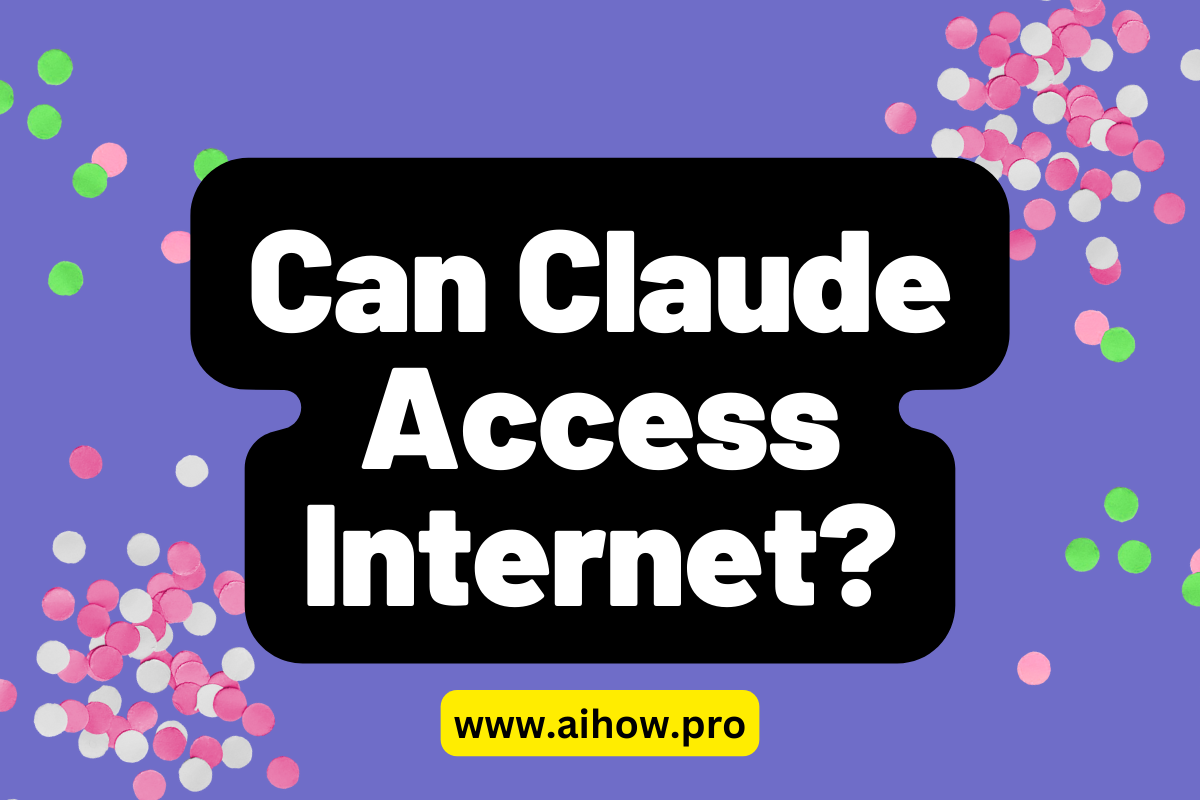In the rapidly evolving world of technology, a question that often arises is: Can Claude access the internet? As someone deeply entrenched in the tech industry, I’ve seen firsthand the incredible advancements in artificial intelligence.
It’s essential to understand that Claude, as an AI model, operates within certain constraints and capabilities. Let me share some insights into how these systems are designed and the extent to which they can interact with online resources.
What is Claude AI from Anthropic?
Claude AI, developed by Anthropic, is a state-of-the-art artificial intelligence model designed to assist in a variety of tasks ranging from creative writing to coding.
It’s based on Anthropic’s extensive research in creating AI that is helpful, honest, and harmless. Claude AI stands out for its capability to handle conversational and text-processing tasks with a high level of reliability and predictability.
Read More: Who Owns Claude AI?
This AI has been fine-tuned to be less likely to generate harmful outputs and to be more steerable, allowing users to achieve desired outcomes with less effort. Moreover, Claude AI is adaptable and capable of adjusting its personality, tone, and behavior based on user directives.
The latest iteration, Claude 3, introduces significant enhancements in capabilities including advanced reasoning, vision analysis, code generation, and multilingual processing.
The Claude 3 family comprises three models: Haiku, Sonnet, and Opus, each tailored for specific performance and speed requirements, making them suitable for various enterprise applications. These models are distinguished by their advanced features such as improved accuracy, longer context understanding, near-perfect recall, and responsible design.
They offer industry-leading speed and intelligence, making them highly effective for tasks requiring quick and accurate responses or in-depth analysis and creativity
Can Claude Tap into the Web?
- Claude does not have real-time internet access for data fetching or updating.
- Relies on pre-existing datasets up to a certain training cut-off point.
- Designed for consistency and reliability in information delivery without live web browsing.
When pondering the capabilities of AI like Claude, a common query is whether Claude can browse the internet. The direct answer is no. Claude, like many AI systems, operates based on a vast dataset it was trained on, up until a certain point in time.
It doesn’t dynamically fetch or update information from the internet in real time. This design choice is intentional, and rooted in considerations for accuracy, security, and the quality of the AI’s responses.
The Rationale Behind Limiting Web Access
Limiting internet access for AI systems like Claude isn’t an oversight but a thoughtful decision. Direct access could lead to several issues, including the potential for disseminating incorrect or biased information, security vulnerabilities, and challenges in ensuring privacy and data protection.
By controlling the environment from which the AI learns, developers can maintain a higher standard of information quality and reliability.
- Ensuring information quality and reliability by avoiding real-time internet data.
- Protecting against misinformation, biases, and data security risks.
- Maintaining user privacy and adhering to data protection standards.
Comparing AI Connectivity: A Diverse Landscape
- Not all AI systems are designed with the same internet access capabilities.
- Some specialized AIs have controlled internet access for tasks needing up-to-date information.
- The level of web interaction varies based on the AI’s intended use and functionality.
It’s a misconception to think all AI systems are cut from the same cloth regarding internet access. The landscape is diverse.
Some, especially those focused on real-time data analysis or online search functionalities, might have limited and controlled internet access to perform their tasks effectively. Others, designed for more general or creative purposes, like Claude, are typically insulated from the web to focus on delivering consistent and secure outputs based on their training.
Envisioning the Future: AI and the Internet
Looking ahead, the interaction between AI systems and the internet is poised for evolution. With advancements in technology and more robust frameworks for security and accuracy, future iterations of AI could feature controlled internet access.
- Potential for controlled, secure internet access in future AI models to enhance capabilities.
- Development of technologies to mitigate risks associated with AI’s web access.
- Case studies in the future could illustrate the benefits and challenges of AI internet integration.
This would allow them to provide more current information while still safeguarding against the pitfalls of open web access. This development would likely be accompanied by case studies demonstrating both the opportunities and challenges such access provides, shaping the trajectory of AI evolution.
Conclusion
In conclusion, while current AI models like Claude do not have direct internet access, this is a deliberate choice aimed at maximizing the quality and security of their outputs.
The AI landscape is varied, with different models tailored to specific needs, some of which might include controlled internet interactions. As we look to the future, the potential for AI to responsibly use the internet could unlock new capabilities, provided that the inherent challenges are carefully managed.
The journey of AI development is one of continuous learning and adaptation, reflecting the dynamic interplay between technological possibilities and the imperative of ethical and secure innovation.
FAQs
Can Claude Access the Internet?
No, Claude lacks real-time internet connectivity or web browsing capabilities.
Does Claude Utilize Your Data?
Yes, Claude employs data for learning purposes but does not retain personal information or specific interaction details.
What Capabilities Does Claude Possess?
Claude is proficient in composing text, providing informed responses, fostering creativity, and supporting educational endeavors, all grounded in its extensive training dataset.
How Does Claude Differ from ChatGPT?
Claude is engineered with distinct functionalities and user experience considerations, prioritizing straightforward interaction and accessibility, whereas ChatGPT may offer a broader array of specialized features.

